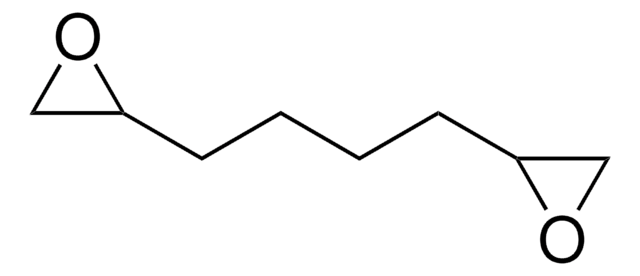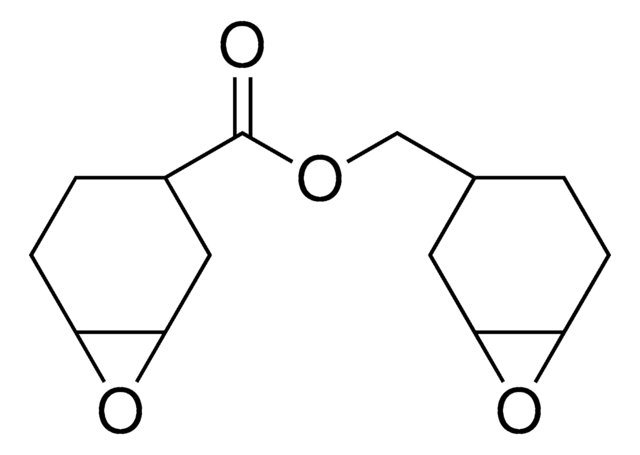124192
1,4-Butanediol diglycidyl ether
technical grade, 60%
Synonym(s):
1,4-Bis(2,3-epoxypropoxy)butane, 1,4-Bis(glycidyloxy)butane, 1,4-Bis(oxiran-2-ylmethoxy)butane, 1,4-Butylene glycol diglycidyl ether, Tetramethylene glycol diglycidyl ether
About This Item
Recommended Products
grade
technical grade
vapor pressure
~10 mmHg ( 20 °C)
form
liquid
concentration
60%
refractive index
n20/D 1.453 (lit.)
bp
266 °C (lit.)
density
1.1 g/mL at 25 °C (lit.)
SMILES string
C(CCOCC1CO1)COCC2CO2
InChI
1S/C10H18O4/c1(3-11-5-9-7-13-9)2-4-12-6-10-8-14-10/h9-10H,1-8H2
InChI key
SHKUUQIDMUMQQK-UHFFFAOYSA-N
Looking for similar products? Visit Product Comparison Guide
General description
Application
- As a cross-linking agent to prepare hyaluronic acid dermal fillers This crosslinking process enhances the gel-like consistency of the filler, making it more durable and longer-lasting.
- As a monomer to prepare epoxy-based graphene nanocomposites that have potential applications in the field of flexible electronics, corrosion resistance coatings, and conductive adhesives. BDDE is chosen for its desirable properties such as low viscosity, good reactivity, and compatibility with graphene.
Signal Word
Danger
Hazard Statements
Precautionary Statements
Hazard Classifications
Acute Tox. 4 Dermal - Acute Tox. 4 Inhalation - Acute Tox. 4 Oral - Aquatic Chronic 3 - Eye Dam. 1 - Skin Irrit. 2 - Skin Sens. 1
Storage Class Code
10 - Combustible liquids
WGK
WGK 2
Flash Point(F)
235.4 °F - closed cup
Flash Point(C)
113 °C - closed cup
Personal Protective Equipment
Certificates of Analysis (COA)
Search for Certificates of Analysis (COA) by entering the products Lot/Batch Number. Lot and Batch Numbers can be found on a product’s label following the words ‘Lot’ or ‘Batch’.
Already Own This Product?
Find documentation for the products that you have recently purchased in the Document Library.
Our team of scientists has experience in all areas of research including Life Science, Material Science, Chemical Synthesis, Chromatography, Analytical and many others.
Contact Technical Service









